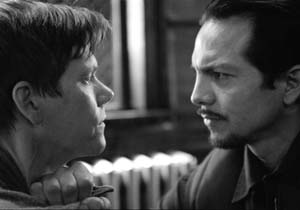WOODSMAN, THE
(director/writer: Nicole Kassell; screenwriter: from the play by Steven Fechter/Steven Fechter; cinematographer: Xavier Perez Grobet; editors: Lisa Fruchtman/Brian A. Kates; music: Nathan Larson; cast: Kevin Bacon (Walter), Kyra Sedgwick (Vickie), Eve (Mary-Kay), Mos Def (Sgt. Lucas), Benjamin Bratt (Carlos), Hannah Pilkes (Robin), Carlos Leon (Pedro), Michael Shannon (Rosen), David Alan Grier (Bob); Runtime: 87; MPAA Rating: R; producer: Lee Daniels; Newmarket Films; 2004)
“There’s certainly a sensitivity and intelligence that went into this psychodrama.”
Reviewed by Dennis Schwartz
First-time director Nicole Kassell picks on a heavy subject matter to tackle (a child pedophile offender) and for the most part succeeds, except for one phony scene where the filmmaker didn’t have the conviction to go all the way with her protagonist and has him go off character and angrily stomp on a man after he abducts and molests a young boy (giving the damaged-goods protagonist a badge of honor so that the audience can sympathize with him more).
The Woodsman is based on an off-Broadway play by Steven Fechter. It features the real-life husband-wife team of Kevin Bacon and Kyra Sedgwick, with Bacon’s understated Method acting performance as the child sex offender a very powerful one. Though it was admittedly difficult to watch Bacon without feeling a certain amount of revulsion, it was also difficult to not only feel pity for him but root for the quiet man as he battles with his inner demons to try and combat his anti-social impulses and be viewed as “normal.” The film to its credit never lays on any preaching or needless explanations or tries to exploit the situation, instead it tries to give us a true picture of what’s it like for someone sincerely trying to find redemption.
Returning to live again in his Philadelphia hometown after serving a 12-year prison stretch as a convicted child pedophile (molesting 10-12-year-old girls), Walter (Kevin Bacon) is a laconic, friendless, frightened parolee who has difficulty fitting into society, facing himself without feeling ashamed, and who finds to his dismay that his crime is thought of by the public as such a perverted one that people are not willing to give him the benefit of the doubt that he can change. Walter is hired in a lumberyard, despite knowledge of his crime, because the owner’s son remembered his father mentioning that Walter was a good worker. The unsure of himself ex-con, tries to go about his business in a quiet way and by not getting friendly with the other workers. The secretary, Mary Kay (Eve), tries to chat him up over lunch and when he refuses to open up suspects he’s hiding a dark secret and snoops around to find out what that secret is (which eventually brings down on him a hateful workplace attack mob). Forklift operator Vickie (Kyra Sedgwick) is also viewed as a fish out of water, and is subject to sexist vulgarities by some of the more ignorant macho types at the lumberyard. The two misfits are drawn together, go to bed and share their darkest secrets. She’s at first shocked by his revelation, but then regains her composure and even though she’s not sure of him she’s willing to make an effort to work things out.
Walter lives in a small, bare apartment, where his living room faces an elementary school playground. He receives frequent unannounced visits by antagonistic local cop, Sgt. Lucas (Mos Def), who takes pleasure in telling him that he’s a piece of shit. It hurts Walter greatly that his sister and entire family avoids him, except for his brown-skinned brother-in-law Carlos (Benjamin Bratt). But he visits only to pay him back for being the only family member who treated him with any kindness when he first married his sister, and Walter soon becomes disturbed by these insincere visits and with the realization that he’s getting the same cold-shoulder Carlos got at first from the family. Walter also sees a therapist regularly to achieve his goal of being normal, who convinces him to keep a diary and record his emotional reactions when in contact with young girls.
There’s certainly a sensitivity and intelligence that went into this psychodrama, that shoots for capturing the small moments. All these moments are expressed one way or another through Bacon’s terse responses and through his desperation to prove that he can lead a “normal life.” The only one willing to stand by him who thinks he can make it is Sedgwick. The problem is I got the feeling the filmmaker wasn’t sure if he could make it, so she brought about an empty ending by having an unconvincing Sedgwick offer Bacon an unearned resolution through her continued support. But there was one scene that was simply magnificent for its tension, daring and freshness, as Bacon is faced with the same temptations that have always plagued him when he meets a 12-year-old birdwatching girl in the park. That scene tells us more about Bacon’s unresolvable problem and its tremendous affect on him, and clues us in on the major struggle going on in his inner life. If only the filmmaker could have used that scene to go further into the exploration of Bacon’s character rather than to quickly retreat to safer ground by covering routine external events, we might have come up with a much deeper and more clearly drawn character-study about a subject most good citizens would justifiably call a monster (someone vilified in fairy-tales).

REVIEWED ON 4/27/2005 GRADE: B